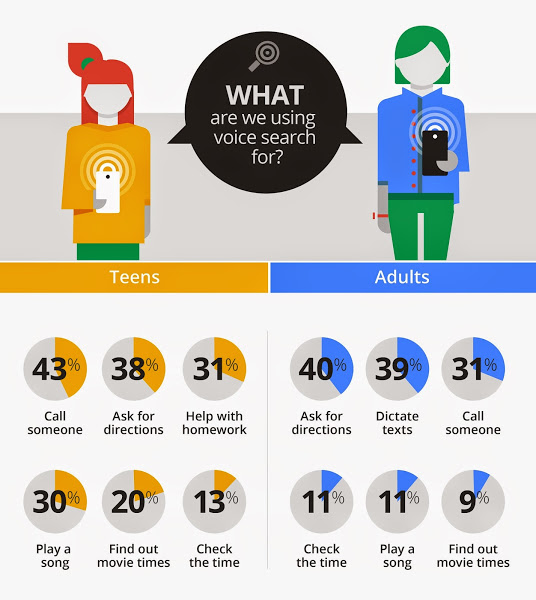When it comes to search, the voice could be the way of the future. And we’re not talking about the TV show…
The other day my partner and I were at home cooking dinner when he asked a question. I was chopping carrots with my back to him, and just as I opened my mouth to answer, a robotic-sounding female voice abruptly interrupted me and gave him the answer he needed. It wasn’t the first time that this had happened, and indeed, it’s something I’ve observed more and more lately, especially with the growth in popularity of wearable technology such as the Apple Watch. I’ve had a number of friends demonstrate how quickly their watch can magically give them the information they need after speaking a short sentence into the receiver.
Voice search is on the rise
Voice search isn’t something I’ve used personally that much, and it could have something to do with the fact that I don’t want the whole train carriage to hear me asking my phone the session times for my questionable movie choices including but not limited to Magic Mike XXL.
But despite your own personal search habits, a recent Google survey of 1,400 Americans found that 55% of teens and 41% of adults use voice search more than once a day. While at the moment, the majority of voice search activity appears to be focused around things like texting and calling people, and checking movie times, it’s definitely a trend to keep an eye on, and I expect that we’ll see more people voice-Googling answers to their burning life questions more and more in the future. As such, there are a few implications for marketers.
Targeting long tail keywords on your site
A great point made in a Business 2 Community article earlier this week is that when we ask a question verbally, it tends to be longer and more complex than when we type it out. It’s something I can definitely agree with if my own Google searches are anything to go by (an example from just this past weekend: “Google, what’s that song that has a video clip where the kid jumps into a time machine and is transported forward in time through to 2015?”)
So what this means for marketers who are trying to optimise their site for certain keywords and phrases is that it’s now more important than ever to not just target the top high-volume short tail keywords on your site. You need to be targeting the long-tail phrases as well.
Diversify your onsite content with a range of keywords
The Business 2 Community piece suggests that having an FAQ section on your website is a great way to ensure you’re answering your audience’s questions before they’ve even uttered the words into their trusty smartphone. But another great way to be constantly populating your site with fresh content is by utilising the blog section of your site to “answer” questions focused around these long-tail queries. The titles of your posts don’t necessarily need to be in question format, but the wording should ideally be similar to the long-tail phrase you’re trying to optimise for. It may even also increase your chances of showing up as the chosen one for Google’s direct answers. And of course – make sure your blog is NOT on a separate domain, or else risk a very stern talking to from your marketing agency.
Remember: Be relevant with your answers
It should go without saying, but don’t try and answer irrelevant queries on your site, or post dozens of low-quality articles just to try and cover all your keyword bases. You still need to provide genuinely helpful advice in the form of articles, infographics, videos, interviews, and the like. Nothing will irritate a user more than getting a direct answer on Google that’s completely irrelevant, but it’s something that according to Search Engine Land, is continuing to grow and grow, with admittedly hilarious results. Don’t be that person.
Finding the right long tail keywords to target
Long-tail phrases tend to be your good old “how”, “why”, “when”, “where”, “who” questions, and there’s a plethora of tools online to help you “scrape” the most relevant ones for your business, based on the kind of things people have searched for before. An old favourite is Ubersuggest, which will literally suggest different endings to an incomplete phrase you type into it. But, you will need something to feed these tools, so begin your keyword research as you normally would for short-tail keywords using things like the trusty Keyword Planner, and then drill down from there.
How do you think voice search is going to impact online marketing in the immediate future?

